ADS Journal Recent Issues
From 2018, Australasian Drama Studies will be published in digital format only.
Use your ADSA membership details to access
Issue 87
Tue, 9 Dec 2025Printable version
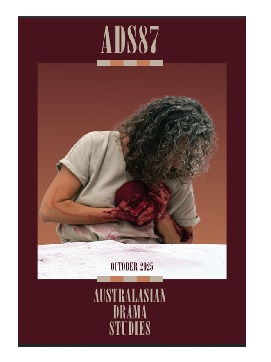 Australasian Drama Studies
Australasian Drama Studies
Issue 87| October 2025
- Issue 87 (Full Issue PDF)
- Contents
- EDITORIAL: CARE, DISCOMFORT AND PERFORMANCE
-
Careful Laughter and Queer Futurity in the Translating and Staging of Austere Rex Gamao’s Ambot sa Essay Kwoah – Erika M. Carreon, Austere Rex Gamao and Chloe Ho
This collaboratively written article highlights the care work at play in the authoring and staging of an agi’s experience by writer Austere Rex Gamao and Manila-based genderqueer collective Ang Mga Baklang Kanal (BKNL) respectively. It includes a first-hand discussion of discomfort experienced by Gamao in the process of textually translating the written essay from English, published in Cordite Poetry Review, to Sward-Hiligaynon, published in Art+Australia. Gamao’s discomfort, mirrored by the uncertainty of BKNL’s audience, is eased but not fully released in nervous laughter whenever performers and stage elements give permission to laugh through linguistic context, lighting and other stage and performative cues. These linguistic and dramatic translations of humour are discussed in relation to Glissant’s notion of opacity and as strategies of resisting queer erasure. We underline the laughter that results from this to open up the potential of experiencing queer time, a glimpse of queer futurity in the here and now.
Keywords
Queer time, queer futurity, discomfort, care -
Devising, Discomfort and Working with the Unknown: Making a Show with Music and Theatre Students at a Regional University – Hannah Joyce Banks and Briony Luttrell In this article, we reflect on our experiences as practitioners and educators leading an annual devising collaboration between Music and Theatre at the University of the Sunshine Coast, that results in a new, one-hour production. We discuss the complexities of devising, in particular how we navigate the balance of wellbeing with encouraging students to work outside of their comfort zones in a devised theatre process full of uncertainty. In response to pedagogy and devising scholarship, and themes that emerged from our four case studies, we propose a new approach, the Creative Collaboration SeeSaw. Our aim in writing this article is to articulate our experiences of being director, musical director, and teachers, as we navigate with our cohorts the tensions between care, comfort, discomfort, learning and safety in a collaborative devising process full of doubt and the unknown.
Keywords
Devising, interdisciplinary collaboration, pedagogy, creative practice, discomfort - Rebus Theatre’s Project Alchemy: On the Limits of Trauma-Informed Approaches in Applied Arts Projects – Vahri McKenzie and Robin Davidson Rebus Theatre’s Project Alchemy recruited fifteen regional artists from five Local Government Areas severely impacted by the Black Summer Bushfires. They produced five major artist-led community projects, including participatory events, public performances and exhibitions. Taking Project Alchemy as a starting point, this collaborative article engages critically with trauma-informed approaches in applied arts contexts, suggesting that the automatic adoption of this now-standardised health training should be re-evaluated in projects prioritising creative practice expertise. Interpreting our discoveries alongside recent and relevant literature, we found, first, that an uncritical over-reliance on health-oriented, trauma-informed frameworks can undermine such approaches’ best intentions. Second, further research is needed to understand the caring relations provided by creative practice itself in projects that adopt trauma-informed approaches in applied arts settings. Creative practice expertise is a distinct social and epistemological category that may be diminished in arts–health work because it lacks the financial resources of health and disaster recovery systems.
Keywords
Trauma-informed care and practice, arts–health, applied arts, creative practice expertise, arts-based evaluation
- Who Cares for the Carers? Verbatim Theatre and Hospital Workplace Culture – Paul Dwyer, Claire Hooker, Louise Nash, Karen Scott and David Williams There is ample evidence of the damage that healthcare practitioners sometimes do to one another in the too-frequently toxic workplaces to which they have become acculturated. Bullying, sexual harassment and discrimination are a common experience in hospitals, for doctors, nurses and allied health workers, and particularly for medical students, junior doctors and trainee specialists. Rates of clinical depression and anxiety, suicidal ideation and suicidal behaviour among this population are well above the norm. In this article, we offer a methodological commentary on the making of Grace Under Pressure, a verbatim theatre project that aimed to help make sense of some of the distress and discomfort experienced by healthcare workers and to support efforts to challenge the culture that produces such mistreatment. We do so in a spirit of critical reflexivity, acknowledging that verbatim theatre has the potential to harm as well as to repair. The questions we address here include: What are the risks against which the promise of verbatim theatre practice must be weighed? What tensions exist between verbatim theatre practice and qualitative methods of research as they are typically deployed by health researchers? How do interviewees/ research participants exercise agency within a process where theatre-makers are often pursuing their own dramaturgical logic
Keywords
Verbatim theatre, methodology, healthcare, hospitals, workplace culture - Whakamana: Enhancing Dignity in Theatre with Precarious Communities – Punitive Welfare and the Deficit of Care in Un-Welfare State (2023) – Rand Hazou and Adrian Jackson This article interrogates various aspects of care, safety, risk and discomfort in the Hobson Street Theatre Company production Un-Welfare State (2023). The verbatim drama explored experiences of the welfare system in Aotearoa and highlighted the apparent deficit of ‘care’ within an increasingly ‘punitive’ welfare system.Using Un-Welfare State as a case study, this article suggests that within the discourse of applied theatre, where practice is arguably increasingly regulated by tighter ‘health and safety’ regimes, attention is increasingly skewed towards notions of care that often uncritically emphasise the need to create safety and minimise risk and discomfort. This article argues that theatre made in such conditions should focus on ‘enhancing dignity’ to bring some nuance to considerations of care in our practice. Drawing on the scholarship of the Dignity of Risk (DofR) from disability and aged care studies, we argue that the notion of dignity opens up potentially useful considerations for arts practitioners and scholars working in precarious settings. This approach acknowledges the value of risk in nurturing the dignity and inherent worth of community participants.In this article, we are interested in what happens when we centre ‘dignity’ within theatre practice, particularly when working in spaces and with communities where notions of ‘care’ and ‘safety’ are tenuous, and where potential for ‘risk’ and ‘discomfort’ is substantial. This article argues that focusing on dignity may be a useful approach to negotiate aspects of care, safety, risk and discomfort within applied theatre projects with precarious communities.
Keywords
Documentary theatre, risk, care, dignity, punitive welfare - Discomfort, Access and Care in (Learning-)Disabled Theatre – Tony McCaffrey The article draws on twenty years of practical experience with Different Light Theatre to highlight issues of access intimacy and friction within the company in the encounter of performers with different disabilities. It shows how these difficulties emerge in collective theatre-making and become the material for performance. It locates these practices within the wider context of disability performance art that confronts audiences with their own vulnerability. Finally, it suggests how performance that incorporates pain and discomfort opens up personal and political possibilities, different modes of understanding and practising access and care, and a more diverse and disability-led experience of theatre.
Keywords
Learning disabled theatre, ethics of care, care aesthetics, access intimacy/ friction, dignity of risk - Disrupting the ‘Double Empathy’ Problem: Creating Cultural Safety for Neurominorities in Performing Arts Education and Employment – Bree Hadley The arts industry in Australia currently demonstrates a commitment to diversity. d/Deaf, Disabled and/or Neurodivergent artists – particularly ‘invisibly’ disabled Neurodivergent artists – have not always felt foregrounded in this discourse. Policy and funding programmes have not equalised our education and employment outcomes. In a recent Psychology PhD, Christine Antonopoulos (2024) examines policy, stated intention and workplace practice, finding that – despite stated intentions – 80 per cent of Australians implicitly perceive Disabled people as cold, incompetent and childlike. In Autism studies, Damian Milton (2012) describes this as a ‘double empathy’ problem. Neurodivergent ways of communicating, collaborating and co-working can ‘discomfort’ Neurotypical workers. Masking to fit into Neurotypical workplaces, projects and processes can ‘discomfort’ Neurodivergent workers. This, theatre-maker Alexander Leggett (2023) says, is not a competence problem – it is a ‘translation’ problem. In this article, I draw on education, employment and arts research, including interviews with Australian artists, to consider strategies to bridge this gap in understanding, and create cultural safety for neurominorities in the performing arts.
Keywords
Performing arts education, performing arts employment, equity, access, neurodiversity, neuroinclusion, cultural safety - Collaborative Care: Artistic Reflection on the Creation of Agiles, an AR Prototype for Creativity and Mobility – Sarah Neville, Eva Sifis, Alex DeGaris, Scott Coleman, Matthew J.W. Thomas and This article offers an artistic reflection on care within cross-disciplinary co-creation, focusing on the development of the Agiles Augmented Reality (AR) application during an artist residency at Assemblage: Centre for Creative Arts. Agiles AR is a digital performance prototype designed as an instrument of care for use in healthcare contexts, encouraging users to explore mobility and balance through creative movement. The co-creation process was underpinned by principles of collaborative care, ensuring the inclusion of participants with and without lived experience of acquired brain injury and disability. Reflections focus on the ethics of care required to navigate interdisciplinary collaboration, and on negotiating discomfort and ease within embodied practice. These insights emerge from within the specific challenges of academic research structures, artistic collaboration, and the embodied experiences of the creative team.
Keywords
Co-creation, care, Augmented Reality, mobility, creativity - Embodied Healing: Scar, Touch and Poetic Witnessing in Performance Art – Tingyu Liu This article explores Marks, Skin and Silent Verbs, a participatory performance art project by Chinese artist Wang Xiyue, presented in Chengdu, China, 2024. Focusing on physical scars, this performance transforms the skin into a site of memory, trauma and healing. Drawing on Didier Anzieu’s concept of the Moi-Peau (Skin-Ego), this article examines how Wang uses intimate gestures, such as touch and temporary poetic tattooing, to reframe scars as symbols of resilience. Through embodied interaction, discomfort becomes a necessary prelude to healing, allowing participants to encounter and explore vulnerability as it emerges in the performance and to reclaim a sense of narrative agency. Participants’ responses reveal the profound emotional impact of the performance, highlighting its ability to foster empathy and empowerment. This article argues that Wang’s performance exemplifies how performance art can act as a relational and ethical practice, offering new possibilities for healing, recognition and the transformation of bodily memory into shared, poetic archives.
Keywords
Performance art, trauma, healing, embodied interaction, scar - Relational Patterns in Performance Art Practices: A Dialogue Between Representative and Performative Care – Cinzia Cremona This article aims to activate a productive dialogue between different modalities of performance, participation and care. The first part of the text introduces the key concepts that inform and shape the research – care, participation and performative relationality are defined in the context of performance art practices. These concepts overlap and lean on each other to form a solid conceptual framework. Performative writing and affective ethnography methodologies complement these analytical tools with a structured first-person voice better suited to access affect.
The body of this text discusses the implications of these concepts and methods for care-focused performances. The meaningful examination of performative and representative care in action, and the concluding comments, are intended to serve as a provocation for productive conversations.
Keywords
Relationality, performativity, caring, performance, affective ethnography - Performing Scenographies of Care: Finding Agency for Environmental Sustainability and Performance Design within Conventional Theatre Practices – Penny Challen, Paula Martins and Tanja Beer Practices of care are evident in theatre’s global shift towards environmental sustainability over the last decade. The ecological turn in the performing arts has seen a rise in efforts to reduce the environmental impacts of theatre production, including questioning the extractivist and unhealthy habits of theatre-making. Historically, an ‘at-all-costs’ approach where the ‘show must go on’, irrespective of the damage to the environment, or individuals involved, has been normalised. For many performance designers, the materially intensive customs of conventional theatre represent a disconnect between personal ecological values and practice, manifesting as a personal conflict with theatre creation systems. Explored through semi-structured interviews with five performance designers, this article examines how Australian practitioners are currently finding agency for ecologically sustainable practices within conventional theatre. Findings revealed the complexity and potential of care as a scenographic criterion, including the personal cost of and discomfort in the pursuit of ecological considerations in an industry yet to embrace sustainable ethics.
Keywords
Ecoscenography, performance design, care, sustainability, conventional theatre - Reviews
- Contributors
Issue 86
Thu, 29 May 2025Printable version
Australasian Drama Studies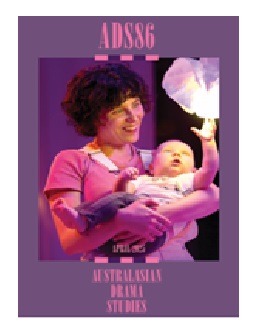
Issue 86| April 2025
2. Contents
3. Editorial
4. Reframing ‘Theatrical Hazards’: Risk and Ambition in Theatre for Early Years
The practice of creatingI and professionally presenting performance works for and with very young children, and their adults, is known as Theatre for Early Years (TEY). Noting that TEY is still considered emergent in Australia because of the extremely small field of Australia-based practitioners, this article builds out of two recent Australian works devised by artist-scholars Sarah Austin and Sally Chance, linking their scholarship and practice in an exploration of what might constitute risk and ambition in TEY, with artistic implications for the dramaturgical frameworks of the works.
Keywords
Theatre for Early Years, young children, participatory theatre, co-creation, participatory dramaturgy
The Negro Ensemble Company (NEC) explicitly aimed to improve the lives of African Americans, both culturally and materially, by producing work about Black experiences, for Black audiences, and by Black theatre practitioners. However, in apparent contradiction to these aims, the NEC’s co-founder and Artistic Director, Douglas Turner Ward, programmed Ray Lawler’s Summer of the Seventeenth Doll in its inaugural season in 1968. In a move that would surprise Australian readers, Ward relocated the play from Melbourne to New Orleans and cast it entirely with Black actors. What had been seen as a quintessentially (white) Australian play now spoke about Black lives and Black experiences. It was a politically contentious choice, and Ward and the NEC faced criticism over the lack of African American playwrights in their first season.
Keywords
Seventeenth Doll, Negro Ensemble Company
6. Pain, Anger and Hope in Prima Facie: Politicising the Contemporary Subject Through Affective Depictions of Rape on Stage
Suzie Miller’s Prima Facie has arguably been the most successful contemporary Australian play of the last decade. Its trajectory since its inaugural 2019 Griffin Theatre Company production in Sydney has been unprecedented: performed in at least fifteen countries, adapted into a novel, and a feature length film underway. Framed through Sara Ahmed’s cultural feminist theory on affective modes of feeling, Prima Facie acts as a powerful impetus for politicising sexual violence on stage. The play’s success hinges on its ability to tap into the power of affective feelings, like anger, pain and hope, intertwined with the embodied experience of sexual violence, as a potential method for politicising the contemporary subject into collectivised action. Consequently, Prima Facie enacts a seemingly impossible twofold task: positioning the complex emotions of sexual violence to political and social efficacy, and, in turn, potentially mobilising audiences to collectively be at the helm of demanding this change.
Keywords
Rape, emotion, affect, embodiment, feminism
7. Liveness in the Work of Ranters Theatre
While the work of Ranters has undergone a clear evolution since our inception as a company in 1994, our practice and methodology have always been grounded in a consistent exploration of liveness in terms of theory, and its practical application. The work of Ranters is designed to highlight what is essential and unrepeatable, a manifesting of the real, in the live exchange between audience and performers. For Ranters, the audient and the performer have always been considered active constituents, inseparable from what is defined as theatre. Over time there has been an increased focus
on the everyday and a theoretical exploration of everydayness to make visible the minutiae of actions within the live physical encounter. There has been a progressive shift in the emphasis to greater liveness, more immediacy and unpredictability.
Keywords
Liveness, everyday, postdramatic, dramaturgy, Ranters
8. Redefining Performance Relationships: Stretching the Limits of Bodily Co-Presence in the Audiovisual Exhibition Near Sighted
This article interrogates the ways in which we understand performance – as a process, as an outcome, and as a philosophical approach. Drawing on the innovative audiovisual exhibition Near Sighted (2023) as a case study, the article examines the ways in which notions of performance can be disrupted and reimagined. The authors employ three primary channels of analysis, drawing on relevant scholarship for each: critical reflection on the creation of work that employs expanded scenography and sonic dramaturgy; analysis of audience role in performance works; and critical engagement with how posthumanism informs performance-making. The article proposes that small shifts in artistic practice can have profound implications for an individual artist and also for the field of performance-making as artists contend with a swiftly changing and unsettled world.
Keywords
Expanded scenography, sonic dramaturgy, posthuman performance-making, participatory performance
9. Cities Under Strain in a Strange Epoch: Writing the Urban Anthropocene in Pomona and The Turquoise Elephant
This article suggests that city space and the Anthropocene can collide innovatively and productively on stage (as they collide outside it) in contemporary theatre. It proposes that writing for performance that embraces the absurdity of the Anthropocene – and that seeks to uncover and interrupt current dominant processes in city space which are driven by late capitalism – is found in Pomona (2014) by Alistair McDowall and The Turquoise Elephant (2016) by Stephen Carleton. These strange and disquieting works satirise late capitalism through heightened form, and use formal innovation to express the urban malaise/ climate anxiety bearing down on the content of the plays. The horror-adjacent, city-focused neoliberal critique of Pomona and the climate change satire of The Turquoise Elephant usefully offer formally connected but tonally disparate examples of this appropriately challenging turn in writing cities and the Anthropocene.
Keywords
Anthropocene, city space, ecological, playwriting
Hélène Cixous’ call for women to write themselves – ‘Woman must write woman’ – has been a guiding principle in my feminist adaptations of classical myths. Inspired by Cixous concept of écriture féminine, a fluid and poetic writing style rooted in the female body, the theatre performance Monstrous Woman (2022) was developed through a methodology grounded in corporeal writing, symbolic imagery, dreamlike fragmentation, emotional excess and polyvocality - embracing its open-ended nature as a feminist practice. This approach acknowledges and critiques traditional structures that have marginalised women in theatre. The labyrinth becomes both a metaphor and a method – an affective, non-linear path requiring emotional awareness, resilience and critical reflection. By rewriting myth, this work aimed to reveal the embedded inequities of the past and reimagine them for contemporary feminist theatre. This work contributes to a global feminist map, offering tools and waypoints for others navigating similar creative and political terrain.
Keywords
Feminist theatre, feminist theory, theatre directing and adaptation, devising, Cixous
11. Connecting Yoga, Playwriting and Romani Culture Through Autoethnography: An Investigation into How Yoga Was Utilised to Create a Dramatic Text for Theatre
This article investigates the relationships among yoga, playwriting and Romani culture in the creation of a dramatic work for theatre. The work’s development was grounded in the author’s experience as a playwright and yoga practitioner of Romani origin. Historically, yoga has adapted to changing societal circumstances and cultural traditions. However, the traditional eightfold path of yoga has not previously been implemented as a developmental structure for playwriting. This autoethnographic, practice-led research project investigates the relationship between yoga and the writing of a play exploring aspects of Romani culture derived from the author’s personal and anecdotal experiences. Yoga principles and practices from the eightfold path were applied to stimulate a state of flow, which fed directly into the playwriting process. Journal writing was concurrently undertaken as a means of reflecting on and guiding the playwriting process and the emerging content. The outcomes suggest the benefits of this approach to dramaturgical development.
Keywords
Yoga, playwriting, autoethnography, flow, Romani
12. Belvoir Beyond the Boys’ Club: Data Feminism and Australian Theatre
At its 2010 season launch, marking long-time Artistic Director Neil Armfield’s final season, Sydney’s Belvoir Street Theatre invited the directors of the season’s productions to take to the stage. Only one woman was present in this group of ten. This moment became a lightning rod for examining women’s career paths to the Australian mainstage at this company and beyond. This article follows performance data to reveal
how Belvoir responded to this outcry. Using improved AusStage records and data visualisations, the authors map women’s representation in positions of creative leadership on the mainstage over time, following Belvoir’s history from 1984 to 2024 as a case study. The AusStage database’s rich holdings also allow us to further contextualise these contemporary trends in the representation of female-identifying and non-binary directors and playwrights on the mainstage within the wider sweep of modern Australian theatre history from the 1950s to the 2010s.
Keywords
Australian theatre, data, feminism, Belvoir, AusStage
13. Disorganised Labour: The Melbourne Workers Theatre and the Cultural Impact of the Prices and Incomes Accord (1983–1996)
This article examines a critical period of transformation in Australian industrial relations. Between 1983 and 1996, trade union membership declined from 60 per cent to 32 per cent, profoundly reshaping the Australian working class. Established in 1987, the Melbourne Workers Theatre produced plays that captured the lived experiences of workers during this transformative era. Close readings of five key plays situate these works within the broader context of neoliberal economic policy and industrial relations. Using an interdisciplinary framework combining theatre and labour history, the article argues that the company’s early plays offer a unique insight into the human impact of trade union decline. By centring the voices of workers, these plays provide a crucial cultural record of this era, challenging abstract economic narratives. This study highlights the value of integrating theatre and labour history to illuminate the lasting legacy of neoliberal policies on Australian working life and the cultural implications of trade union decline.
Keywords
Trade unions; community theatre; Melbourne Workers Theatre; neoliberalism; Art and Working Life
14. A Beautiful Disaster: Bringing the Commons to Convivial Theatrical Emergency Scenario Planning
This article introduces the idea of Disaster Theatre as a form of applied theatre that engages directly with emergency readiness, and response. The production of Disaster at Vogelmorn: The Dress Rehearsal is a case study to draw attention to the generative tension between command-and-control and relational practices within and between emergencies. Enabling convivial commoning, knowledge sharing, and problem solving within a liminal space, may support communities to build capacity. However, there is still a call for a more intentional approach to readiness training and planning between disasters. Finding a balance between structure and improvisation, calmness and ‘intra-festum’ in training approaches could help to realise policy aspirations for emergency management agencies in Aotearoa New Zealand. It could support community-led responses and strengthen community resilience – goals sometimes put into the ‘too hard’ basket – and also offer a new seam of creative opportunity to applied theatre practitioners.
Keywords
Applied theatre, emergency planning, spatial commoning, intra-festum, Disaster Theatre
15. Reviews
16. Contributors
Table of Contents
- Issue 86 (Full Issue PDF)
- Contents
- Editorial
- Reframing ‘Theatrical Hazards’: Risk and Ambition in Theatre for Early Years
- ‘Nobody Who Saw the Play Would Ever Think That It Was Set in Australia Originally’: The Negro Ensemble Company’s Production of Summer of the Seventeenth Doll
- Pain, Anger and Hope in Prima Facie: Politicising the Contemporary Subject Through Affective Depictions of Rape on Stage
- Liveness in the Work of Ranters Theatr
- Redefining Performance Relationships: Stretching the Limits of Bodily Co-Presence in the Audiovisual Exhibition Near Sighted
- Cities Under Strain in a Strange Epoch: Writing the Urban Anthropocene in Pomona and The Turquoise Elephant
- Woman Writes Woman: A Way Through the Labyrinth Using Hélène Cixous’ Model of Écriture Féminine to Adapt Classical Texts into New Feminist Theatre Performance
- Connecting Yoga, Playwriting and Romani Culture Through Autoethnography: An Investigation into How Yoga Was Utilised to Create a Dramatic Text for Theatre
- Belvoir Beyond the Boys’ Club: Data Feminism and Australian Theatre
- Disorganised Labour: The Melbourne Workers Theatre and the Cultural Impact of the Prices and Incomes Accord (1983–1996)
- A Beautiful Disaster: Bringing the Commons to Convivial Theatrical Emergency Scenario Planning
- Reviews
- Contributors
Issue 85
Fri, 22 Nov 2024Printable version
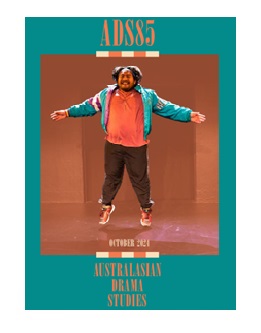 Australasian Drama Studies
Australasian Drama Studies
Issue 85| October 2024
- Issue 85 (Full Issue PDF)
- Contents
- Editorial
- Karakia in Rehearsal: A Reflection on Indigenous Praxis Fran Kewene
This article is a short reflective piece which explores a personal approach to using a Māori ritual called karakia. This reflection explores the importance of karakia as a culturally responsive theatre praxis and an act of decolonising and embodied love within the context of the rehearsal process in Aotearoa New Zealand. Told using a personal story of grief and loss, this reflection introduces the reader to: the whakapapa of karakia, and how karakia is used in Marae Theatre in Aotearoa New Zealand. It also provides examples of karakia used in theatre praxis and concludes with a challenge to the reader to explore their own biases before including karakia authentically into their own theatre praxis.
Keywords
Decolonisation, karakia, Māori theatre, rehearsal, praxis
- The Waka of Love: Decolonial Anti-Racist Praxis of Aro Ki Te Hā led by, with and for Indigenous Kids in Aotearoa
This article describes The Waka of Love, a Theatre Marae-informed stage production situated within a Kaupapa Māori research project examining impacts of racism on mokopuna Māori in Aotearoa. Underpinned by ethical co-designing – an approach aligned with Indigenous rights that emphasises power-sharing, accountability and positive transformation – and through wānanga-based creative participatory inquiry grounded in Te Ao Māori, mokopuna Māori collaborated to address racism and its impacts on hauora. The Waka of Love serves to illustrate decolonial anti-racist praxis that challenges colonial knowledge systems through empowerment of mātauranga Māori and whakamoemoeā for mokopuna Māori. Central to The Waka of Love is that of aro ki te hā – the sacred reverence for the breath – fostering deep interconnectedness, compassion, empathy, and respect for oneself, one another, Papatūānuku, and the universe. The Waka of Love underscores decolonial anti-racist
efforts toward liberation, enabling the flourishing of mātauranga and hauora for mokopuna Māori, their whānau and communities.
Keywords
Love, Indigenous, Māori, decolonial, racism
- Seeing Yourself to See Others: The Importance of Critical Love in Work with Marginalised Communities
This article discusses the unintended harm that Applied Theatre practitioners can inflict on their participants due to their unconscious biases and assumptions. The author argues that this is the result of ‘fake love’, wherein practitioners only centre the vulnerabilities and experiences of their participants while neglecting how they participate in broader systemic issues. The article proposes a shift from ‘fake love’ to ‘Critical Love’, which requires practitioners to engage in a critical and deep self-reflection on their own biases, privileges, and the power dynamics they bring to the room. The author provides examples of her own critical self-reflection and how these may affect participants, and she encourages practitioners to do the same. Through Critical Love, the article argues, practitioners can foster more authentic and empowering relationships with participants, which has the potential to drive real social change and justice within Applied Theatre practice and beyond.
Keywords
Critical Love, Applied Theatre, facilitation
- Performing Compassion/Performing Aroha in Learning Disabled Theatre
In 2023, eight learning disabled performers from Different Light Theatre collaborated with eighteen drama school students from NASDA (National Academy of Singing and Dramatic Art) in Christchurch on a production of Faust.Us based on Marlowe’s
text. The framing principles of the process were intended to be whanaungatanga (kinship and belonging), kotahitanga (unity) and, particularly, manaakitanga (hospitality) in which the non-disabled staff and students would afford support for the learning disabled performers. However, the emotional and theatrical outcome of this process was a profound reversal of this ‘economy of affection’ in the collaboration and the performance. It was in fact the support of the learning disabled actors for their non-disabled colleagues that proved invaluable and unshakeable. While in inclusive theatre we might assume that the performance of compassion would be for the benefit of the learning disabled actors, this flipping of the script had real power to hit everyone in the guts.
Keywords
Learning disability, inclusion, radical compassion, manaakitanga
- ‘Approaching with Alofa’: Transforming Acting Spaces for BIPOC Creatives
This talanoa (conversation) between final year PhD candidate Sepelini Mua’au (Levī-Saleīmoa & Matāutu Falelātai) and Nicola Hyland (Te Ati-Haunui-a-Pāpārangi/Ngāti Hauiti) explores the ‘why’ of Sepe’s project that centres around decolonising frameworks and Theatre in Aotearoa. Exploring the whakapapa of this research, Sepe speaks to his upbringing as a second-generation, New Zealand-born Samoan and delves into key moments in his creative journey as an actor, writer, director and theatre-maker. The talanoa questions historical institutions with colonial foundations to encourage conversations around decolonised ways of working as a BIPOC (Black, Indigenous, Person of Colour) creative in Aotearoa. What does approaching rehearsal spaces with alofa/aroha mean for BIPOC creatives? This talanoa acknowledges Sepe’s experiences within the Samoan concept of the vā, which centres around the formation and maintenance of meaningful relationships with people, and. in this instance, Sepe’s creative practice.
Keywords
Decolonial, BIPOC, actor training, Pasifika
- Indigenous Performances of Love beyond Settler Recognition in Vigil and The Unnatural and Accidental Women
The proliferation of the discourse of recognition in state politics is, as many anti-colonial scholars have argued, a form of governmentality in settler colonial nations. How does love among the colonised disrupt colonial recognition? What learnings do we gain when we theorise acts of decentering colonial recognition in terms of love? This article explores these questions through Anishinaabe artist Rebecca Belmore’s performance Vigil, and Métis playwright Marie Clements’ play The Unnatural and Accidental Women from northern Turtle Island (Canada). The article theorises love as an insurgence against what Dylan Robinson calls ‘perceptual logics of settler colonialism’.
Keywords
Recognition, Canada, love, MMIW (Missing and Murdered Indigenous Women), performance
- Adaraye Aragalaya (Struggle for Love): Sri Lanka’s ‘Occupy’ Moment, Plural Political Enactments, and the End of the Rajapaksas
The article explores how Aragalaya embodies Judith Butler’s concept of plural performativity as a call for justice and rejection of precarity. This unique Sri Lankan socio-political movement, often called ‘Adaraye Aragalaya’ (struggle for love), reflects its non-violent ethos and practice of inclusivity. In April 2022, groups of young people occupied the Galle Face promenade beside the Presidential Secretariat building in Colombo to demand that the Sri Lankan President, Gotabaya Rajapaksa, resign. Butler suggests that when masses occupy public spaces to protest, exercising their ‘plural and performative right to appear’, the gatherings embody ‘plural performativity’, and the bodies enact ‘political meanings’. The article features an
analysis of three artists’ performances: a trans woman, a man who carried a large wooden cross, demanding justice for the victims of the 2019 Easter bombings, and a performer who painted his body red to commemorate the 1983 Black July massacre victims.
Keywords
Sri Lanka, Aragalaya, plural performativity, Judith Butler, non-violent protest
- Wellbeing in the Performance of Morally Questionable Characters: Enacting Love and Compassion for Human Woundedness
The Healthy Conservatoires (UK), covering drama, music and dance training institutions, has included the spiritual (defined as ‘exploring beliefs, values and ethics and creating a sense of purpose and meaning in life’) as one of eight key dimensions in its online wellbeing framework. Yet few drama schools have formally incorporated considerations of moral and spiritual development as part of their curriculum. In 2020, interviews with nine professional actors documented the impacts of playing a villain or other amorally inclined characters. The study found that three factors can impact actors’ personal and relational wellbeing in enacting such characters: 1. the requirements of empathy in the creation and performance of character; 2. the potentiality of moral distress and injury in the creation and performance of character; and 3. the shaping of intrinsic and extrinsic values during professional identity formation. Love and compassion for human woundedness needs to be honoured in drama schools.
Keywords
Actor training, moral injury, spirituality, intrinsic values, wellbeing
- Hine’s Monologue Delivered to Her Husband Talite at His Tangihanga, on the Eve of the Poroporoaki
Hine’s Monologue is a poroporoaki to her late husband Talite, as she comes to terms with his passing after the unfortunate collapse of their marriage. Despite enduring love, the obstacles they faced together in the form of personal challenges exacerbated by societal inequities and mandates from church authorities undermined their ability to live in love. Hine’s monologue is a call to whānau and community to better support young, brown couples and their families, and a reminder that the kupu aroha is both tūingoa (noun) and tūmahi (verb); in equal parts a nameable thing, a destination, an action, state, and condition. Hine’s monologue, performed by Erina Daniels and Emma Katene, was one of six monologues woven together under the title ONO and presented at both Tahi Festival 2023, Wellington and Koanga Festival 2023, Auckland.
Keywords
Aroha, Māui, Whānau, Church, Poroporoaki
- Contributors
Issue 84
Wed, 24 Apr 2024Printable version
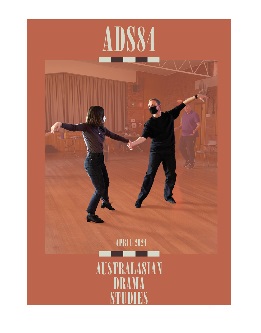
Australasian Drama Studies
Issue 84| April 2024
Table of Contents
- Issue 084 (Full Issue PDF)
- Contents
- Editorial
- ‘Poor Gaels Are Tormented, Troubled and in Sorry Plight’: Reimagining an Anti-Colonial Irish Performance Tradition Through the Voices of Australian Female Convicts – Melita Rowston
- Witnessing Touch in Theatre-Making Processes: Exploring Agency for ‘Witness-Participants’ of Staged Intimacy and Violence – Susan Fenty Studham and Gabrielle Metcalf
- His Book, Her Play: Kate Mulvany’s Adaptations of Masquerade and Jasper Jones – David Simes
- The Audience as Social Collective: The Role of Intra-Audience Interaction in the Communication of Narrative in Immersive Theatre – Melissa Herburg
- The Rough and the Tumble: Queer Themes in Robert Lord’s Plays – Chris Brickell
- ‘Hello Person That Is Me’: Voices of Regional Youth in Playwriting Projects – David Megarrity, Jenna Gillett-Swan and Maisie Crosdale
- Embedding Indigenous Perspectives within Actor Training: An Account of Inclusive Teaching Practices – Andrea L. Moor and Nicole Reilly
- The Flower and the Frame: On Transplanting an Heirloom Play into Fresh Ground – Jane Woollard and Peta Murray
- Imaging People Who Use Drugs: How Parliamentary Actors Picture and Tell Stories about the Subjects of Drug Law Reform – Sean Mulcahy and Kate Seear
- Remember My Name: The Critical Role of ‘Selves’ in Transformative Acting – Suzie J. Jarmain
- Bodies of Truth: Considering the Ethics of Physical Dramaturgy in Documentary Theatre – Missy Mooney
- Waltzing Around the Veranda: Reclaiming the Dandy in Australian Bush Drama – Matthew Bapty
- Review
- Contributors
Issue 83
Wed, 20 Dec 2023Printable version
Australasian Drama Studies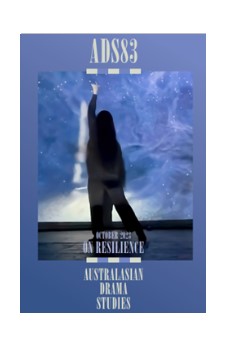
Issue 83| October 2023
Table of Contents
- Issue 083 (Full Issue PDF)
- Contents
- Editorial
- Performing Arts and the Climate Emergency: Horizon-Scanning the Futures of Practice and Scholarship Susanne Thurow, Helena Grehan and Jane Davidson
- The Myth of the Resilient Artist: Goodwill and In-Kind Contribution in the Performing Arts Sector Rea Dennis and Katy Maudlin
- Pivoting ‘Resilience’: Australian Women Playwrights, Community and the COVID-19 Crisis Rebecca Clode and Julieanne Lamond
- Performing Precarity and Transilience Rand Hazou
- Femme Queen Energy: Community as Protest and Embodied Transfeminine Resistance in Vogue Ballroom Tristan Niemi
- Digital Dance Practices: A Model for New Mobility in Performing Arts Rebecca Weber
- The Brink: Receptive Generosity and Kindness in the Development of a Choreographic Pedagogy of Consent for Actor Training Samantha Chester and Renée Newman
- Emotional Aesthetic(s): Re:orienting Desires Joanna Cook
- In the Ruins of the Future: The Role of the Creative Artist in a Time of ‘Thin’ Belief Julian Meyrick
- Reviews
- Contributors
Issue 82
Fri, 23 Jun 2023Printable version
Australasian Drama Studies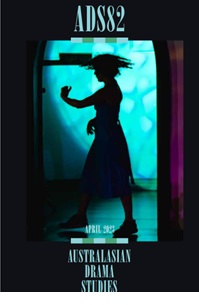
Issue 82 | April 2023
Table of Contents
- Issue 082 (Full Issue PDF)
- Contents
- Editorial
- Provocation #1: Why I Make Theatre: For Now – A Theatre of the Everyday Raimondo Cortese
- Performance Improvisation: No Former Performer Has Performed This Performance Before and the Aesthetics of Play Rea Dennis, Penny Baron, Carolyn Hanna
- ‘Brave Space’: Investigating Consent and Boundaries as a Framework for Culturally Safe Collaborative Arts Practice Sarah Austin, Isabella Vadiveloo
- The 1948 Old Vic Tour: Viv and Larry Down Under Chris Hay
- A Workshop in Process: The Playwrights Workshop in Aotearoa Murray Edmond
- The 25th Anniversary Tour of Krishnan’s Dairy: Touring Aotearoa New Zealand during the COVID-19 Pandemic James Wenley .
- Navigating the Staging of Richard Brome’s ‘Comic Therapy’ in The Sparagus Garden Kim Durban
- Our Own Time and Space: Locating Autistic Poetics in Theatre Sarah Wilson
- A Playwright in Exile: Mammad Aidani Russell Fewster
- Provocation #2 Brisbane Festival’s Hyperlocal Hope: The Dramaturgical Feat of Live and In-Person Programming During COVID-19 Hannah-Leigh Mason
- Reviews
- Contributors
Issue 81
Fri, 18 Nov 2022Printable version
Australasian Drama Studies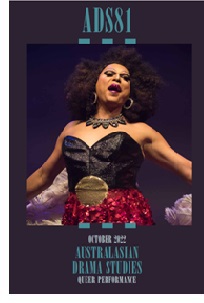
Issue 81 | October 2022
Table of Contents
- Issue 081 (Full Issue PDF)
- Contents
- Editorial: Queer Performance Jonathan Bollen , Alyson Campbelland, Liza-Mare Syron
- Koori Gras: A radical celebration of sparkling defiance – Liza-Mare Syron
- An HIV love story: Jacob Boehme’s Blood on the Dance Floor’s queer and Indigenous revolt – Jacob Boehme, Alyson Campbell and Jonathan Graffam
- Tracing Transitions – Stace Callaghan and Leah Mercer
- A Queer Performance New Wave in Sydney: Inside Club Bent 1995-1998–exploring hybridity and community – Catherine Fargher
- The Future is Now: Queer Utopian Longing and the Utopian Performative in Today x Future in Metro Manila – Ian Rafael Ramirez
- “Show me how you do it down under”: Realness at The West Ball II and the translation of vogue ballroom in Australia – Billy Kanafani
- Theatre as a Space of Resistance and Protest: Queer Politics and Colour of Trans 2.0 – Neethu Das. K and Vellikkeel Raghavan
- “We’ll meet you underground”: transcultural performance practices in queer space and time – Jeremy Neideck, Nathan Stoneham, Younghee Park, and M’ck McKeague
- Birds of A Feather: On Queerness, Performance, The Coming Back Out Ball, and LGBTIQ+ Elders Dance Club – Peta Murray, Adelaide Rief, Marnie Badham, Tristan Meecham, Bec Reid, Lenine Bourke
- A Rainbow in the Age of Covid: Contemporary Queer Theatre in Aotearoa – James Wenley and Nathan Joe
- Reviews
- Contributors
- test
Issue 80
Thu, 2 Jun 2022Printable version
Australasian Drama Studies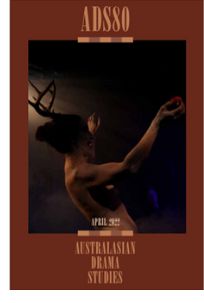
Issue 80 | April 2022
Table of Contents
- Issue 080 (Full Issue PDF)
- Contents
- Editorial Yoni Prior
- Looking Forwards to the 1950s: Utilising the Concept of Hauntology to Investigate Australian Theatre History Julian Meyrick
- Before Neo-Burlesque, There Was Queer Cabaret: Revisiting Queer Performances from Melbourne in the 1990s Maude Davey
- Shadows of the Australian Performing Arts Ecology Görkem Acaroğlu
- ‘Time’s Up, Motherf*%ker’: Emasculation and Restaging Justice for Women in Aotearoa New Zealand Nicola Hyland
- The Use of Irony in Pākehā Performance Adriann Smith
- Director/Mother/Outlaw Katy Maudlin
- Traversing the Proscenium: Audience Enworlding in Musical Theatre Stuart Grant, Narelle Yeo and Melissa Fenton
- ‘What Do You Mean We Aren’t Performing Shakespeare?’: A Contemporary, Devised Performance Curriculum at a Regional Australian University Gillian Arrighi, Clare Irvine, Brian Joyce and Carine
- Between Freedom and Control: A Chorus-Centred Bakkhai for Community Ensemble Vahri McKenzie
- Driving “Transformational change”: using ecodramaturgy to develop a more sustainable theatre ecosystem Dr Saffron Benner
- Oppression and allyship in Australia’s Deaf Arts. Racheal Missingham and Bree Hadley
- Reviews
- Contributors
Issue 79
Mon, 20 Dec 2021Printable version
Australasian Drama Studies
Issue 79 | December 2021
Table of Contents
- Issue 079 (Full Issue PDF)
- Contents
- Editorial Pia Johnson and Miles O’Neil
- A Conversation Between Performance Photographers Brett Boardman and Jeff Busby, with Notes by Heidrun Lohr Pia Johnson
- The Intimate and the Epic in Plunge: A Writer-Director’s Approach to Heterarchical Composition Kate Shearer
- A Performative Investigation of the Agency of Sound: Mapping the Sound/ Soundscape Portrait Angela Viora
- ‘Where’s the AV Guy?’: A Conversation with Rhian Hinkley, Margie Medlin and Nick Roux Yoni Prior
- Seed Value: Collaboration and Creative Development in Composed Theatre David Megarrity
- Siren Song: Strengthening Community through Sonic Insurgency Miles O’Neil
- Towards a Post-Pandemics of Sound in Performance Chris Wenn
- Liveness in the Digital Age: Performance Case Studies Russell Fewster, Geordie Brookman and Richard Chew
- Authenticity within Digital Performance: A New Framework to Understand the Relationship between Audience, Vision Technology and Scenography Tessa Rixon, Gene Moyle, Steph Hutchison and Joslin
- A Feminist Lens in the Rehearsal Room: On the Bodily Education of Young Girls Pia Johnson in conversation with Adena Jacobs
- Genealogies of Darkness Paul Jackson
- A Sound Conversation: Performance-Makers and Sound Practices with Roslyn Oades, Madeleine Flynn and Tamara Saulwick Kate Hunter
- Reviews
- Contributors
Issue 78
Thu, 27 May 2021Printable version
Australasian Drama Studies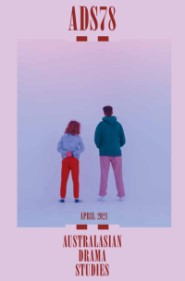
Issue 78 | April 2021
Table of Contents
- Issue 078 (Full Issue PDF)
- Contents
- Editorial Yoni Prior
- Staging Music in Shakespeare Richard Fotheringham
- From Bejewelled Crucifix to Modern Dress: ‘Shakespeare and Stage Costume’ from Wilkie to Bell Rachel Fensham
- Visualising the Story of Theatre in Sydney: Venues, Repertoire and Change, 1920–2020 Jonathan Bollen
- The Guthrie Report and Its Discontents Chris Hay
- Recognising the Face of Australian Theatre: Authentic Diversity and the Case of Metanoia Glenn D’Cruz in interview with Görkem Acaroğlu, Shane Grant and Greg Ulfan
- ‘It Caught the Zeitgeist’: Interview with Andrew Bovell Nathan Hastie
- ‘Sustained Personal Contact’: Recent Australian Productions on Tour in China Anne Pender
- What Are The Ties That Hold Us Together? The Smartphone Networks in As If No One Is Watching and Body of Knowledge Abbie Victoria Trott
- Reviews
- Contributors
Issue 77
Wed, 20 Jan 2021Printable version
Australasian Drama Studies
Issue 77 | January 2021
Table of Contents
- Issue 077 (Full Issue PDF)
- Contents
- Editorial: Regional Theatre in Australia Jennifer Beckett, Rachel Fensham and Paul Rae
- Passionate, Not Parochial: Local Theatre in Launceston Asher Warren and Jane Woollard
- Flexible Theatrics in Early Goldfields Ballarat Ailsa Brackley du Bois
- The Suitcase Royale: Sonic Explorations of Gothic Victorian Towns Miles O’Neil
- A Community of Producers: A Conversation about Vocabulary, Weather, Creative Problem-Cracking, Distance and Performance in Regional Western Australia Chloe Flockhart and Paul McPhail
- A Gym for Empathy: A Conversation about Regional Migrant Stories, Theatre and the Banquet of Life Elena Carapetis and Anthony Peluso
- The Anchor, the Centre, the Shelter, the Dwelling: A Conversation about Contemporary Theatre Practice in Regional Australia Jude Anderson and Joe Toohey
- That Very Specific Place: A Regional Australian Theatre Conversation Ros Abercrombie, Paul McPhail, Anthony Peluso and Joe Toohey
- The Economic Aesthetics of Three Regional, Unpaid-Led Theatre-Producing Companies Anna Loewendahl
- Ariel Songs: Performing Cultural Ecologies of Ballarat Angela Campbell, Tanja Beer, Richard Chew and Kim Durban
- ‘It Was a Cracker’: Listening in to Youth Audiences, Regional and Urban, with Show Reports Abbie Victoria Trott
- Desert Stages: The Place of Theatre in the Barkly Region’s Creative Ecology Sarah Woodland and Brydie-Leigh Bartleet
- ‘Dreaming, It Is Like Breathing Air’ Edwin Lee Mulligan and Dalisa Pigram Ross
- Shared Bodies: Dramaturgies of/for Listening and Hearing Angela Conquet
- Reviews
- Contributors
Issue 76
Thu, 28 May 2020Printable version
Australasian Drama Studies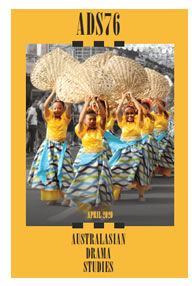
Issue 76 | April 2020
Table of Contents
- Issue 076 (Full Issue PDF)
- Abstracts
- Editorial Yoni Prior
- Dancing, Marching and Baton Twirling with the Virgin: Performing Community at the Peñafrancia Festival in the Philippines William Peterson
- Festivals, Funerals and Circuses: The Impact of Space and Design in the Construction of Meaning and Audience Experience Natalie Lazaroo and Jennifer Penton
- Polyfest Postponed: Performing ‘Us’ in Christchurch in 2019 Tony McCaffrey
- Disciplined Subjects and Social Performance: Entertainments at the Fremantle Lunatic Asylum, 1873–1906 Jonathan W. Marshall
- Wassailing and Festive Music in Shakespeare’s Twelfth Night Kathryn Roberts Parker
- Local Archive, Distant Reading: Performance Space at Cleveland Street and Carriageworks Caroline Wake and Boni Cairncross
- Enacting Restorative Justice: Shakespeare and Tikanga Māori in Cellfish (2017) Rand Hazou
- Hold On: Australian Innovations in Access Aesthetics Madeleine Little, Sarah Austin and Eddie Paterson
- Contemporary Performance and Climate Change: Re-defining the Australian Landscape Narrative Linda Hassall
- Celebrating Fifty Years in Prague: Reflections on Australian Scenographic Identity through the Prague Quadrennial of Performance Design and Space Tessa Rixon and Sarah Winter
- Entanglements with Time: Staging Duration and Repetition in the Theatre Deborah Pollard
- An Actress Weeps: Corporeal Dissonance in the Actor’s Experience of Performing Testimony in Eduardo Coutinho’s Jogo de Cena Rea Dennis
- Shifting Hybridity: An Intercultural Arab–Australian Shadow Theatre Performance Lynne Kent
- Review
- Contributors
Issue 75
Wed, 18 Dec 2019Printable version
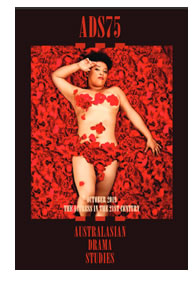 Australasian Drama Studies
Australasian Drama Studies
Issue 75 | December 2019
Table of Contents
- Issue 075 (Full Issue PDF)
- Editorial: The Actress in the 21st Century Mary Luckhurst
- Woman as Subject: Critical Perspectives of Australian Commercially Successful Plays with Leading Roles for Female Actresses Margaret Haining and Caroline Heim
- Interview with Candy Bowers – Intersectionality and the Australian Theatre Industry Sarah French
- Nicole Kidman: Transformation and the Business of Acting Mary Luckhurst
- Interview with Zoe Coombs Marr Miles O’Neil
- Vanishing Acts: The Actress and the Archibald Prize Fiona Gregory
- Interview with Julie Forsyth – Career Visibility: ‘You Need Someone Who Sees You’ Yoni Prior
- Performing Technical Innovation: The Pioneering Audio Work of Tamara Saulwick Miles O’Neil
- Interview with Margi Brown Ash – Finding Balance: Mental Health, Wellbeing and Female Performers Lynne Bradley
- Cross-Gender Playing Techniques: Actresses and Innovation in the Portrayal of Female Jingju (Beijing /Peking Opera) Roles Megan Evans
- Interview with Yoni Prior Miles O’Neil
- Musical Theatre and Australian Leading Ladies: Legacies of the Past and Current Challenges – ‘How Lucky We Are to Be Alive Right Now’ Trevor Jones
- Playing with Extremes: The Travelling Sisters and Contemporary Sketch Comedy Sarah Peters
- Reviews
- Contributors
Issue 74
Tue, 14 May 2019Printable version
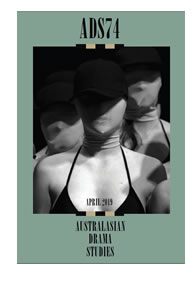 Australasian Drama Studies
Australasian Drama Studies
Issue 74 | April 2019
Table of Contents
- Issue 074 (Full Issue PDF)
- Editorial
- The NDIS and Disability Arts in Australia: Opportunities and Challenges Bree Hadley, Gerard Goggin et al
- Verbatim Theatre and a Dramaturgy of Belonging Sarah Peters
- A West End Celebrity Proselytises the Bonds of Empire: Seymour Hicks and Bruce Bairnsfather’s Old Bill in 1920s Australia Veronica Kelly
- Visions of Restorative Justice in Theatre, Theory and Practice Paul Dwyer, J.R. Martin and Michele Zappavigna
- Breathtaking Performance: a room with no air’s Exhaustive Aesthetics of Holocaust Memory Bryoni Trezise
- Playing the Edinburgh Lottery: Six Decades of New Zealand Theatre at the Edinburgh Festival Fringe James Wenley
- Toward an Ethical Practice: Child Performers in Contemporary Performance for Adult Audiences Sarah Austin
- Creating Feminine/ist Theatre: Écriture Féminine as a Framework for Directors Laura Hartnell
- Ranters: Rehearsal and Development Process – How Is the Text Enacted? Raimondo Cortese
- The Veil of Queer Aesthetics: Lindsay Kemp and the Subtext of Gay Desire in Oscar Wilde’s Salomé Gerrard Carter
- Reviews
- Contributors
Issue 73
Wed, 23 Jan 2019Printable version
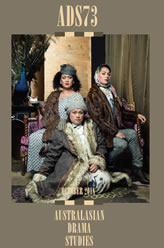 Australasian Drama Studies
Australasian Drama Studies
Issue 73 | October 2018
WARNING: Aboriginal and Torres Strait Islander readers are advised that the article Namatjira: Beyond the Script contains an image of a person who has died.
Table of Contents
- Issue 073 (Full Issue PDF)
- Editorial – Turangawaewae: A Place to Stand in Contemporary Indigenous Performance in Australasia and Beyond Nicola Hyland, Liza-Mare Syron and Maryrose Casey
- Foreword Anne Marshal
- The Hepatitis C Trilogy: A case for Indigenous theatre as a contemporary manifestation of traditional healing business. Blayne Welsh
- Shot Bro: A Theatrical Korero about Depression and Suicide in Aotearoa/ New Zealand Sally Richards
- Engaging with Local First Nations Communities through the Performing Arts Denise Wilson, Tandi Palmer Williams, Karilyn Brown and Liza-Mare Syron
- A Renaissance in Wellington Maori Theatre Tanemahuta Gray
- Transnational Connections: First Nations Conversations through Making Performance Liza-Mare Syron
- Namatjira: Beyond the Script – Visual and Performative Aesthetics as Conduits for the Communication of Western Aranda Ontology Susanne Thurow
- WOER WAYEPA – The Water Is Rising: A Torres Strait Islander Approach to Knowledge Mobilisation, and Saibaian Approach to Cultural Knowledge Transference to Performative Storytelling Margare
- Performances of Belonging Maryrose Casey
- A Conscious Un-couplet: Wahine Maori Stand Up to Shakespeare Nicola Hyland
- Choreographed Pasts: A Historiographic Inquiry into Australian and Indigenous Australian Concert Dance Luke Forbes
- Finding a Sense of Place in the Pacific Diaspora: Pasifika Performance in Aotearoa David O’Donnell
- The Whanau We Have Always Had: The Future Is Indigenous Hone Kouka
- Reviews
- Contributors
Issue 72
Sun, 1 Apr 2018Printable version
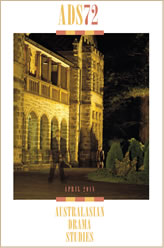 Australasian Drama Studies
Australasian Drama Studies
Issue 72 | April 2018
Table of Contents
- Issue 072 (Full Issue PDF)
- Editorial
Julian Meyrick, Yoni Prior, Meredith Rogers - Harry Lyons Is ‘Here, There and Everywhere’: Australia’s Late-19th-Century Global Entertainment Broker
Gillian Arrighi - A ‘Great Anti-War Play’: Bury the Dead on the World Stage
Lisa Milner - Landscapes as Graveyards: Spectral Return and Performativity in the Contested Landscape
Jonathon W. Marshall, Emily Duncan - Postcard from the Edge: Tom Holloway’s Beyond the Neck and the Limits of Verbatim
Caroline Wake - Diagrams of Influence: A Model for Charting Artistic Lineages
Melanie Beddie - The Precarious Lives of Actors
Ian Maxwell, Mark Seton, Marianna Szabó - 148 Weekly Ticket Footscray – A Fifteen-Year Audience
Merophie Carr - Divisive Dramaturgy: Community Engagement in Contemporary Mediated Publics
Asher Warren - Reviews
- Contributors

